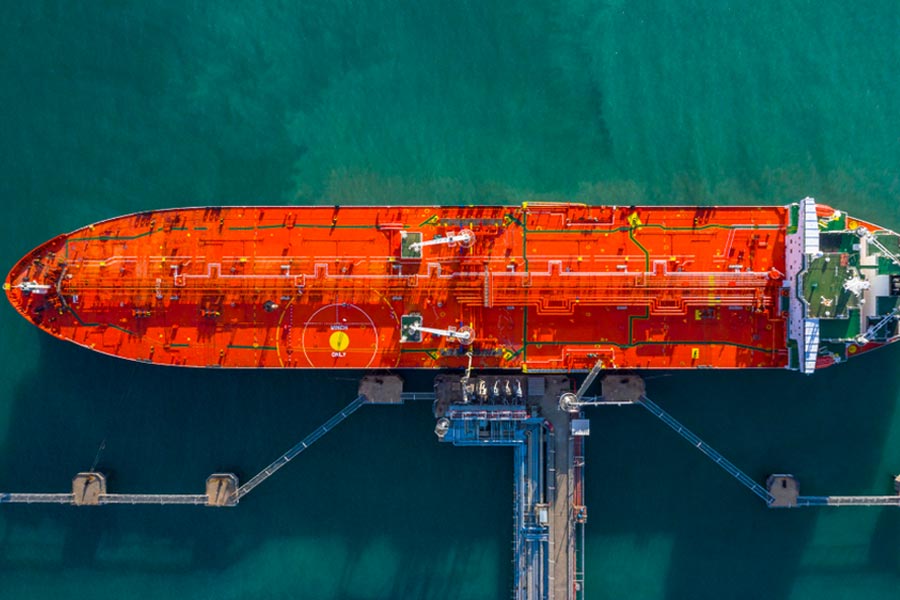The international shipping world is in turmoil with fleet owners offloading oil tankers to stay under the Western sanctions radar and India, whose refineries have been record buyers of Russian crude, is centre-stage in the upheaval.
Consider previously unknown Gatik Ship Management, based in Mumbai, which expanded at spectacular speed to emerge as one of the world’s biggest oil tanker fleet owners. Now, from a peak of 58 ships – all bought in slightly over a year for an estimated more than $2 billion – the secretive firm’s fleet has on paper shrunk to just four, according to ownership databases. S&P Global Market Intelligence says Gatik Ship Management has “evolved” into new registered companies with a number of its vessels incorporated into freshly minted entities outside India.
Since the Russians invaded Ukraine 17 months ago, ships have been moving from direct Russian ownership or nationality to new companies domiciled in India, the UAE, Gabon and elsewhere, part of the so-called “dark fleet” helping keep Russian oil flowing. In fact, a massive 864 companies were created in the maritime industry last year “with an association or relationship to Russia”, says Byron McKinney, analyst at S&P Global Market Intelligence. The ownership of these companies keeps shifting and the identities of more than 500 so-called “ultimate owners” are mysteries.
A similar story to Gatik’s is unfolding at Geneva- and UAE-based Fractal Shipping, which in the last one year amassed a sizable fleet, though considerably smaller than Gatik’s. Fractal, too, now is offloading its fleet to different companies and maritime publication Splash 24x7 estimates that its number of tankers is down to “low single-digits". Reports vary about how many tankers Fractal bought with Splash 24x7 saying the firm had a fleet of around 22 tankers. Another maritime portal, VesselsValue, reckons Fractal had 27 vessels and that 26 of these had been bought since May 2022.
While Gatik and Fractal appear to be pulling a disappearing act, there’s another UAE-based company sailing in the opposite direction. Radiating World Shipping, which bought its first ship last November, now has a fleet of 18 tankers, according to Splash. Its latest ship is the Fast Kathy bought in May for $44.5 million, the maritime portal reports. Fast Kathy is what’s categorised as a Suezmax, a large crude oil tanker that can travel through the Suez Canal. Radiating World is owned by a little-known Pakistani Shahid Naziri.
The effect of EU and US sanctions on trade with Russia has given birth to what’s called the "grey" and the "black" fleets carrying oil and other products around the world. “China and India are the main destinations for Russian grey and dark fleet vessels,” says portal Re: Russia.
About two tankers a day are arriving in India after the 30-35 day journey from Russian ports in the Black Sea or the Baltic.
Around 80 ships which were originally Russian also got themselves registered with the Indian Register of Shipping (IRS) around August 2022. Splash believes the IRS is “the classification society with the largest market share of the so-called dark fleet.” The IRS, which was the fastest-growing classification society in 2022, has issued a stiff rebuttal to such charges: “ The vessels are operated by various entities in UAE and in other parts of the world. None of the companies which own the ships are registered in Russia.” The IRS insists safety is its key responsibility.
Separately, S&P Global reported that, “83 companies located in India are working directly with Russian shipping assets or own vessels making Russian port visits.” It added that, “44 of these were established and set up in 2022.”
Another company facing EU sanctions is UAE-based Sun Ship Management which was a subsidiary of the Russian shipping company Sovcomflot. In April 2022 Sovcomflot is said to have transferred control of about 90 ships to Sun. In February, it was sanctioned by the EU. Similarly another UAE-based company, K&O Ship Management which has a fleet of 10 ships, also faces the threat of sanctions.
“Prior to the introduction of the G7 oil price cap in December 2022, a number of vessels moved “from direct Russian ownership of nationality to new companies domiciled in India and the United Arab Emirates,” says S&P Global.
An investigative report by Splash determined that in February 421 ships were part of what it called the “shadow tanker fleet”. Most of this parallel armada are older ships with an average age of 18 years on the high seas. Considering that Russia accounts for some 14 per cent of global crude oil supply before the war, the volume of freight the vessels are transporting is enormous.
As a result of all this buying and selling activity, the prices of oil tankers have rocketed in the last year. The number of transactions has also risen steeply and India is part of this game also though there no exact numbers due to the surreptitious nature of the deals. Of course, shadow fleets in the past have helped Iran and Venezuela sidestep US sanctions. But experts say the clandestine supply chain required to continue transporting Russia’s oil is operating at a much huger scale.
Some ships coming to India also do what’s called a midsea transfer of their viscous cargo. They turn off transmitter and other communication devices when approaching the transfer point, enabling them to dodge sanctions.
This is considered by the International Maritime Organisation to be a “highly dangerous practice”. There is concern that many of the vessels have substandard maintenance, creating potential for oil spills or collisions, and have a “severe lack of insurance,” says VesselsValue analyst Rebecca Galanopoulous Jones. In fact, should one of these vessels have an accident, authorities won’t know who to seek damages from.










